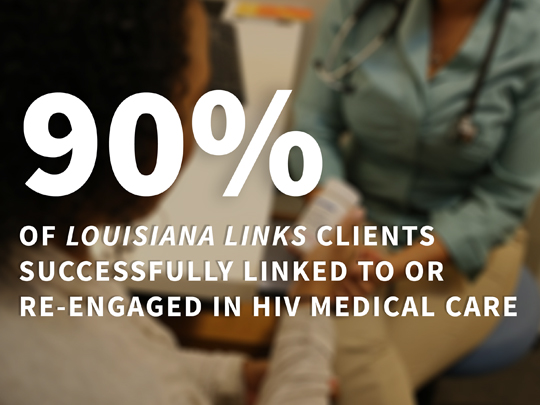SMAIF in Action: Louisiana Links Program Finds “Missing” People Living with HIV to Keep Them and Others Healthy
Topics

Engaging people in HIV medical care and achieving the goals of care have greatly improved in the participating health care sites since the implementation of the Louisiana Links program.
It is essential that every person living with HIV be in medical care and receive treatment for their entire life (or until there is a cure). This keeps them healthy and reduces the risk of HIV transmission to others. This is easier to say than it is to achieve. The reality is that people living with HIV often face multiple challenges to staying in care year after year. These can affect anyone, but according to data [PDF 2.32 MB], racial and ethnic minorities and people in the southern states living with HIV are less likely to receive the benefits of consistent HIV care over time.
Funding from the Secretary’s Minority AIDS Initiative Fund (SMAIF) supported multiple sites operated by the Louisiana Links program in New Orleans, Baton Rouge, and Shreveport through the Care and Prevention in the United States (CAPUS) Demonstration Project. The Louisiana Links program connects people living with HIV to medical care and provides the support needed to help them stay in care and improve their health outcomes.
The Louisiana Links program uses public health surveillance data to identify people living with HIV who have not been retained in care. The program then supports them in re-engaging in care, and also assists people who are having difficulty adhering to HIV treatment. Criteria for enrollment in the program are:
Persons newly diagnosed with HIV but with no evidence of care 30 days after diagnosis
Persons with an HIV diagnosis with no evidence of care in the past 12 to 36 months (later changed to 9-36 months)
Persons with an HIV diagnosis in care, but still experiencing high viral loads
Louisiana Links uses state health department surveillance data in new and innovative ways. Linkage to Care Coordinators were hired to use the data to successfully locate, engage, and enroll people living with HIV into the Louisiana Links program. The Linkage to Care Coordinators not only find “missing” people, they also provide them support and assistance. They attend medical and social service appointments with clients to ensure success overcoming barriers to care and navigating complex health care systems. They work closely with local health care providers to ensure that they maximize the resources and supportive services available to each client to increase linkage to care and long-term retention. They also educate clients about HIV and the importance of staying in care and adhering to treatment so that they can maximize the health benefits they receive from HIV care. This model creates an atmosphere of respect and support for the client that helps them to be empowered to manage their HIV medical care on their own.
Preliminary analyses show that the Louisiana Links program was able to successfully link and re-engage 90% of the 686 enrollees to HIV medical care during the SMAIF program period. Of the clients who were already in care but had not achieved viral suppression, 2 out of 3 (68%) had gotten the virus under control and were virally suppressed at their last lab result.
The SMAIF-funded Louisiana Links program showed success in finding “missing” clients, re-engaging them in HIV care, and delivering objective improvements in their health and wellbeing that will keep them healthy and prevent onward transmission of HIV to others. Due to the effectiveness and impact of the Louisiana Links intervention, the Louisiana Department of Health continued the program and has expanded services with core HIV prevention and care funding from the Centers for Disease Control and Prevention and the Health Resources and Services Administration (HRSA).
Next week, we’ll share a story of how Louisiana Links has positively impacted one of its clients.
SMAIF improves HIV prevention, care, and treatment for racial and ethnic minorities through innovation, systems change, and strategic partnerships and collaboration. SMAIF supports 33 projects in 40 states, D.C., Puerto Rico, and Guam that are conducted by 200+ health departments, health centers, and community organizations. For more information on SMAIF take a look at HIV.gov/smaif.